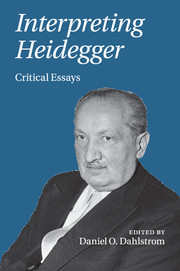Book contents
- Frontmatter
- Contents
- List of contributors
- Acknowledgments
- Method of citation and bibliography of Heidegger's works
- Introduction
- I Interpreting Heidegger's Philosophy
- II INTERPRETING HEIDEGGER'S INTERPRETATIONS
- III INTERPRETING HEIDEGGER'S CRITICS
- 11 Analyzing Heidegger: a history of analytic reactions to Heidegger
- 12 Lévinas and Heidegger: a strange conversation
- 13 Derrida's reading of Heidegger
- Index
- References
12 - Lévinas and Heidegger: a strange conversation
Published online by Cambridge University Press: 11 April 2011
- Frontmatter
- Contents
- List of contributors
- Acknowledgments
- Method of citation and bibliography of Heidegger's works
- Introduction
- I Interpreting Heidegger's Philosophy
- II INTERPRETING HEIDEGGER'S INTERPRETATIONS
- III INTERPRETING HEIDEGGER'S CRITICS
- 11 Analyzing Heidegger: a history of analytic reactions to Heidegger
- 12 Lévinas and Heidegger: a strange conversation
- 13 Derrida's reading of Heidegger
- Index
- References
Summary
During the academic year of 1928–1929, Emmanuel Lévinas attended the University of Freiburg with the purpose of studying with Edmund Husserl. As Lévinas himself would later put it, “I went to Freiburg because of Husserl and discovered Heidegger.” As Husserl's successor, Heidegger had arrived in Freiburg himself in 1928 and Lévinas was a student in Heidegger's first Freiburg lectures, Introduction to Philosophy (GA 27). Lévinas would come to regard Heidegger as a thinker of major importance and Being and Time one of the premier texts in philosophical history. Lévinas did assess features of Heidegger's thought critically. In order to understand the points at issue, it is necessary to understand them in the context of Lévinas' overall thought, and it is also necessary to understand them in the context of Heidegger's overall thought. The context thus expands rapidly. Lévinas' favorable judgments regarding Heidegger's thought would eventually come with a specific reservation, as in the following response by Lévinas to a question in a recorded conversation with Dutch philosophers at the University of Leyden in March 1975: “It is from this idea that I have even understood better certain pages of Heidegger [specifically, the discussion of ‘mineness’ (Jemeinigkeit) in Being and Time]. You know, when I pay homage to Heidegger, it is always costly to me, not because of his incontestable brilliance, as you also know.” The reference is clearly to Heidegger's public support, in the early 1930s, of the National Socialist regime in Germany.
- Type
- Chapter
- Information
- Interpreting HeideggerCritical Essays, pp. 256 - 272Publisher: Cambridge University PressPrint publication year: 2011
References
- 1
- Cited by

